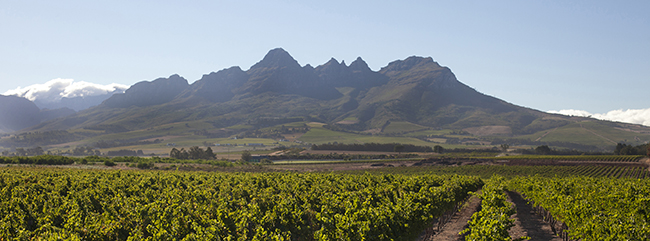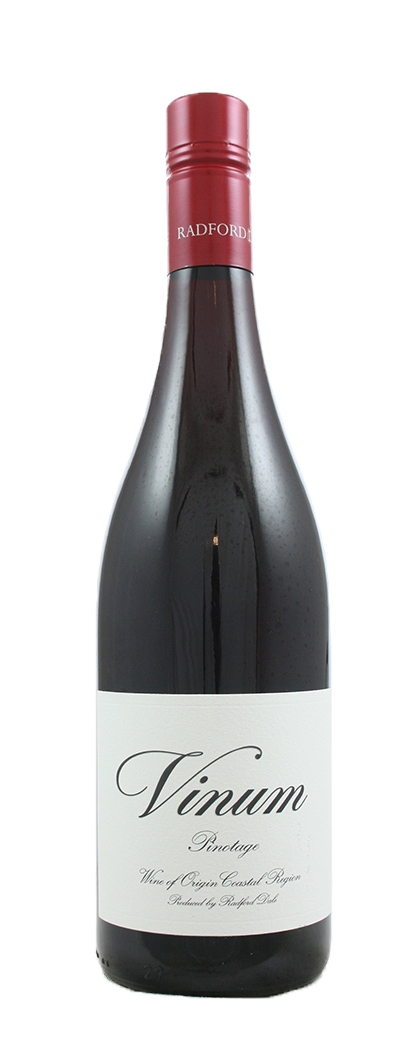So, we were having lunch in The Barbary on Westbourne Grove the other week and Alex Dale popped open a bottle of Vinum Pinotage from Stellenbosch. I don’t have a love/hate relationship with any grape variety with the exception of Pinotage (because it hates me). But wow, what was this bouquet of flowers and fruits in the glass? What a charming nose, really appetising with aromas of violets and roses and then red fruits flooding over the tongue. It was as if the wine wanted to embody the best of the twin ancestries of the grape variety that is Pinotage crossing, namely Cinsault for the delicate fruitiness and licks of liquorice, and Pinot Noir for the firm core and the fine finish with subtly-grained tannins.
Radford Dale was founded in 1998, by drinking buddies and youthful idealists Ben Radford and Alex Dale. When Barossa-born Ben went back to his homeland some years later, Alex stayed on and decided to develop Radford Dale into one of the very best wine names in the country. And he did.
In 2023, Radford Dale celebrated its 25th anniversary. A quarter of century of experimentation, discovery and development, moving towards sustainability in business and farming practice, towards an understanding of terroir and provenance. Early champions of Elgin Pinot Noir, they were the first producer for 20 years to plant Gamay (reflecting Alex’s love of the grand wines of Beaujolais) and championed Pinotage as a variety that could exceed its reputation if handled sensitively.
Now Radford Dale adhere to follow sustainable agricultural methods and light-handed, minimal additive winemaking at their two cellars: on the ocean-facing granite slopes of the Helderberg Mountain in Stellenbosch and an organic estate up in the mountains in cool-climate Elgin. The wines are site-driven made with the belief that South African wines should reflect their natural environment, vintage and distinct terroirs, hence using natural yeast fermentations, low or no adjustments and minimal usage of new oak, tending also to have restrained alcohols and healthy natural acidities for the sake of balance.
It was as if the wine wanted to embody the best of the twin ancestries of the grape variety that is Pinotage crossing.
The grapes for the Vinum Pinotage are sourced predominantly from a vineyard located in the northern part of the Stellenbosch region and are a quarter of a century old. As is typical in our region, the alluvial soil in this vineyard contains a high proportion of decomposing granite, which comes from the surrounding mountains.
In this particular vintage, the harvest was later, the crop smaller and the grapes had excellent acidity. These were harvested by hand, early in the morning, into 20kg lug boxes to avoid any crushing and then transported to their cellar for sorting into the best healthy bunches. The primary objective was to ferment wild using native yeast, with carbonic fermentation to unlock the gentler side of the Pinotage variety. The whole berry fermentation took place in open-top, 600-litre oak demi-muids, for a very soft extraction of colour, flavour, and tannin.
After fermentation the wine was sent to press, gently removed from the skins and then put into small, Burgundian barrels (228-litre and 300-litre), an equal mix of 2nd, 3rd & 4th fill for malolactic fermentation and maturation.
Back to drinking this wine in our Notting Hill restaurant. What is marked in this wine is its fresh red fruit expression, the notes of wild berries (a certain pithiness), the lift in the mid-palate and the clean silky finish. As with their single block Frankenstein Pinotage, the nature of this wine demonstrates that if you treat the “creature” with respect (or in this example, try to gently preserve rather than over-extract flavours) you end up with a happier, more harmonious wine.
2022 Radford Dale Vinum Pinotage, Stellenbosch
*
Interested in finding out more about the wines of Radford Dale? Contact us directly:
shop@lescaves.co.uk | sales@lescaves.co.uk | 01483 538820



